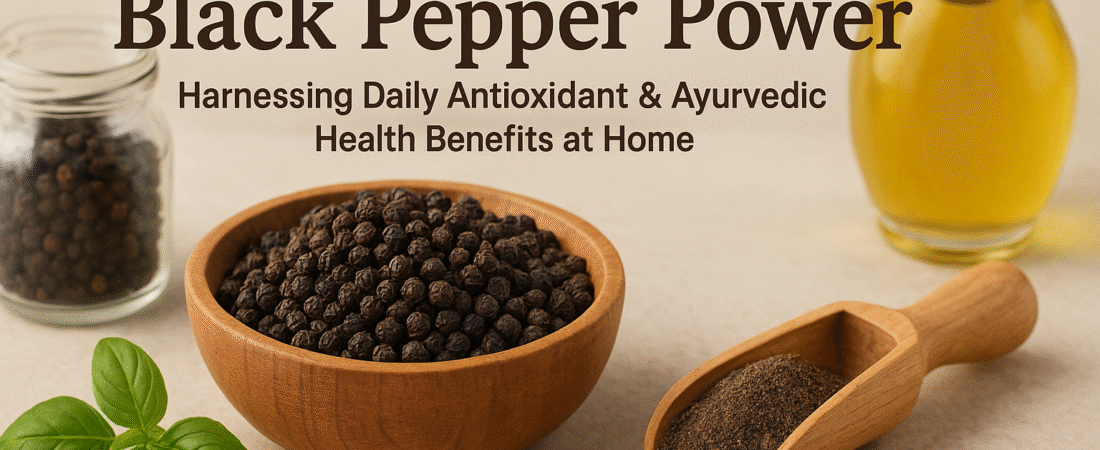Say hello to the small black bead on your spice rack, black pepper, AKA piper nigrum, that’s more than a mere flavor booster. Packed with antioxidant power, this everyday kitchen staple unlocks deeper health secrets, from better digestion to stronger immunity, all through time-tested Ayurvedic wisdom.
Black Paper: Minimal, Modern, Magical
For thousands of years, this modest spice has been a highly valued treasure in Ayurvedic medicine. It is for its warming, cleansing, and disease-preventing virtues.
Current science today supports what the old healers intuitively understood: the health benefits of black pepper. It is packed with piperine, a powerful antioxidant that aids the body in fighting oxidative stress, enhancing digestion, and increasing immunity.
Here, you will learn about black pepper antioxidant benefits and how using Ayurvedic black pepper remedies helps in nutrient uptake to calm respiratory conditions. Ready to elevate your wellness routine using what’s already on your shelf?
What Makes Black Pepper a Natural Antioxidant?
The health benefits of black pepper are mainly hidden in its active ingredient, piperine. The bio active alkaloid not only gives pepper its pungent taste but also provides powerful antioxidant benefits to neutralize damaging free radicals responsible for aging, inflammation, and chronic illness.
What makes piperine stand out is its capacity to enhance bio availability, that is, it improves your body’s uptake of vitamins, minerals, and herbal nutrients.
For instance, combining black pepper with turmeric can raise curcumin absorption by as much as 2000%, enhancing both of them. Pepper becomes a natural partner to many Ayurvedic treatments as a result, amplifying their effects.
3. Health Benefits Backed by Science
Let’s take a look at how black pepper improves absorption and fights oxidative stress, boosting overall health naturally.
Digestion & Nutrient Absorption
Triggers digestive enzymes: piperine, an antioxidant found in black pepper.
It triggers the release of gastric and pancreatic secretions.
This secretion break down food effectively and ensure improved nutrient extraction from your food.
Prevents bloating and gas: black pepper for digestion and immunity focuses on its natural carminative effect.
It calms intestinal muscles, easing trapped gas, bloating, and overall digestive irritation after rich or heavy food.
Increases absorption: From curcumin in turmeric, to fat-soluble vitamins, to antioxidants in vegetables, black pepper substantially enhances bioavailability.
So, your body absorbs more nutrition from the foods you consume every day.
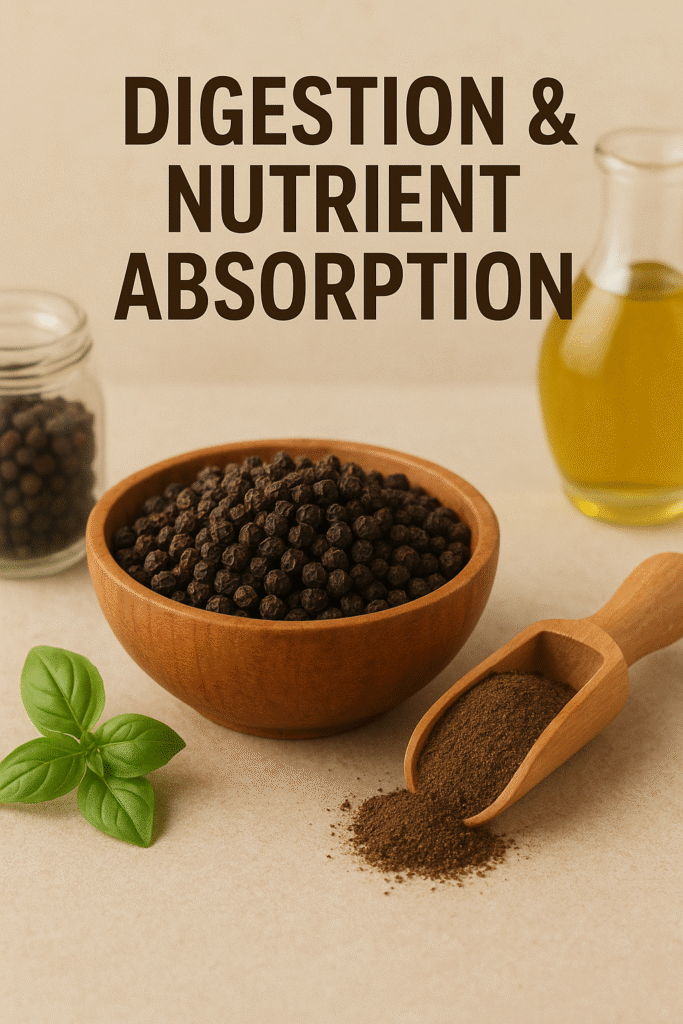
Anti-Inflammatory & Joint Health
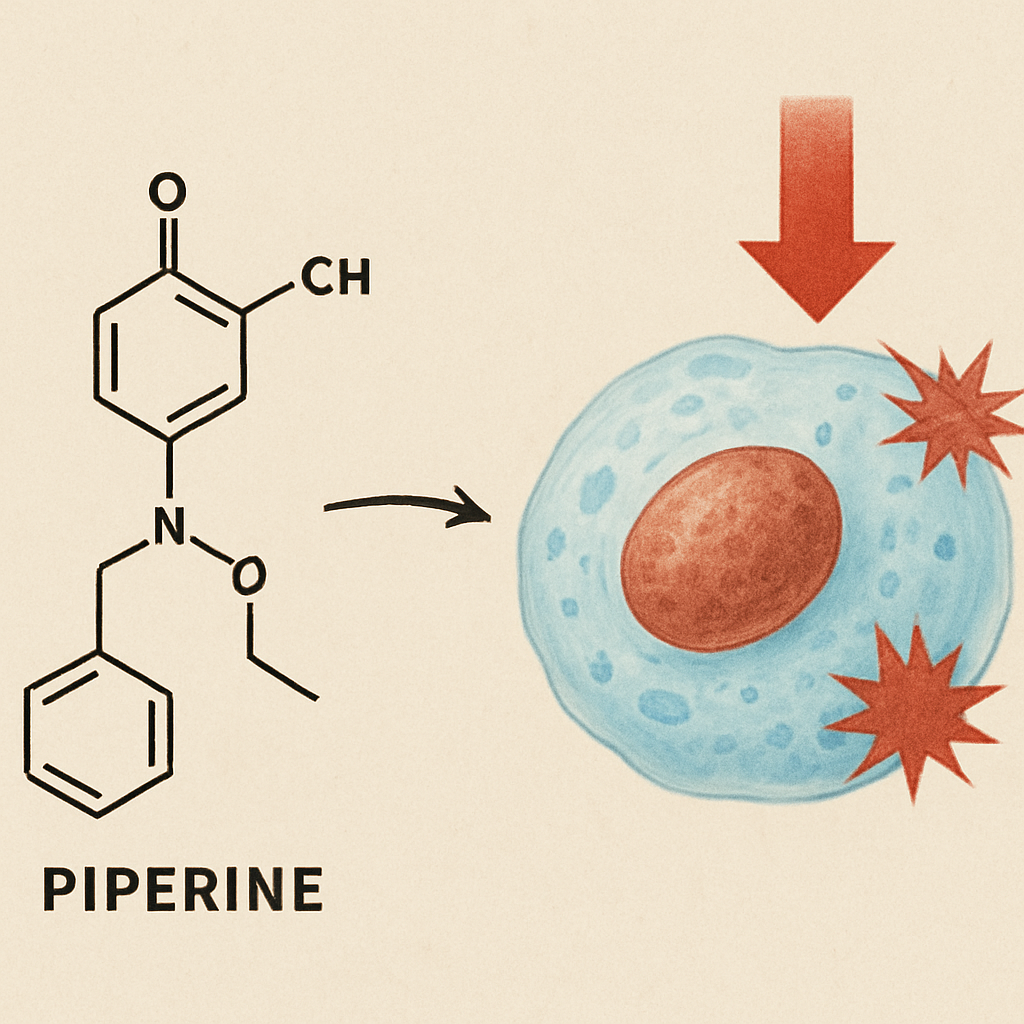
Piperine anti-inflammatory effects: Medical research indicates that piperine, an antioxidant found in black pepper.
It has the ability to quash inflammatory cytokines and oxidative stress.
Thus, providing relief from symptoms of arthritis, sore muscles, and stiffness.
Ayurveda often combines pepper with heat-producing spices such as ginger and long pepper to stimulate circulation.
It keeps joints lubricated, and promote more unrestricted, more effortless movement in cold weather or with age.
In other words, black pepper for joint health and respiratory relief is a natural and proven Ayurvedic method.
Brain & Metabolic Function
Neuroprotective potential: Piperine inhibits oxidative damage to brain cells.
It facilitates neurotransmitter balance, and early studies indicate potential to slow deterioration in Alzheimer’s, Parkinson’s, and age-related cognitive impairment.
These factors connect black pepper metabolism and Ayurveda, making it one of the most valuable ingredients for natural health improvement.
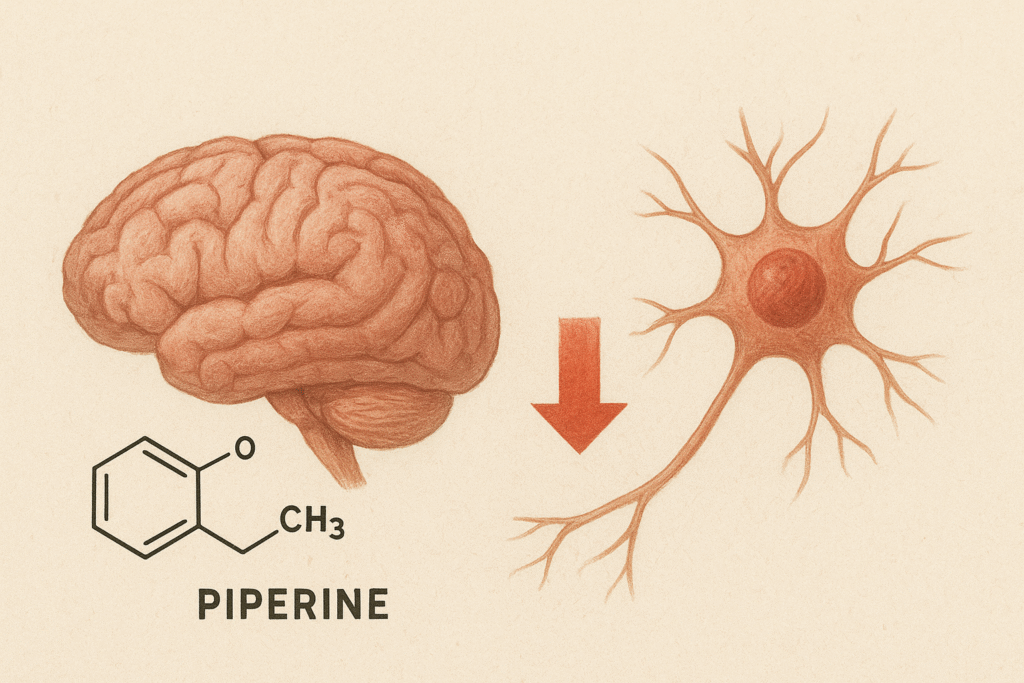
Metabolic health: It is able to normalize blood glucose levels, enhance insulin sensitivity.
It promotes healthy cholesterol levels, and stimulate balanced metabolism.
It also lowering risks of metabolic syndrome and allied health issues.
Immune & Respiratory Support
Antimicrobial action: Black pepper has constituents that protect against infectious bacteria, some fungi, and environmental pathogens.
It helps to strengthen the immunity on a daily basis.

Respiratory relief: Conventional medicine employs pepper-infused tonics and teas to loosen mucus, open airways, and warm the body.
Ginger-pepper tea can treat a sore throat while facilitating faster recovery from the common cold.
Weight Management & Detox Benefits
Metabolism booster: Piperine’s thermogenic impact enhances calorie burn.
Hence, decreases fat cell formation, and aids in healthy weight management in conjunction with a healthy diet and exercise.
Ayurvedic detoxifier: Pepper is a “diaphoretic,” encouraging mild sweating, which, according to Ayurvedic belief, releases toxins, enhances circulation, and invigorates the internal environment of the body.
It is for increased vitality. Black pepper digestion support can also help detox the body and minimize the chances of unwanted weight gain by boosting metabolism.

4. Ayurvedic and Home Remedies with Black Pepper
Here are some simple home Ayurvedic remedies using black pepper for health.
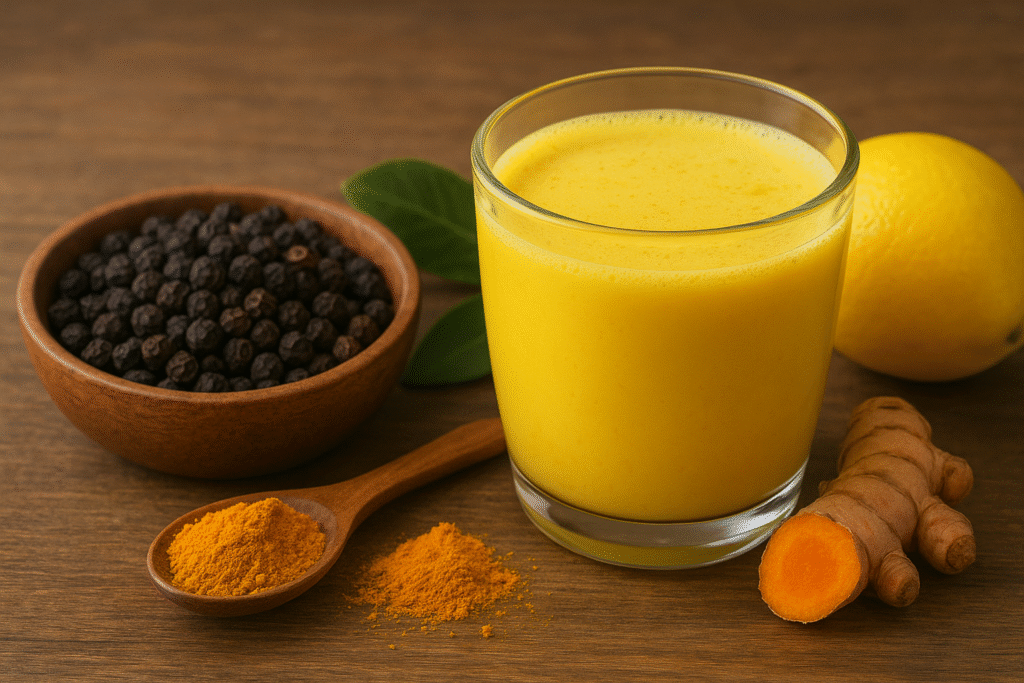
Pepper Tea for Digestion
Boil 4–5 whole peppercorns with thin slices of ginger in 1 cup of water in a small pot for 3–4 minutes.
Strain into a cup and stir in honey just before consuming.
The spiciness and heat activate circulation and calm the throat.
Benefits: Relieves bloating, gas, and postprandial heaviness, soothes a mild sore throat, decongests the nose.
It promotes natural detox through gentle perspiration.
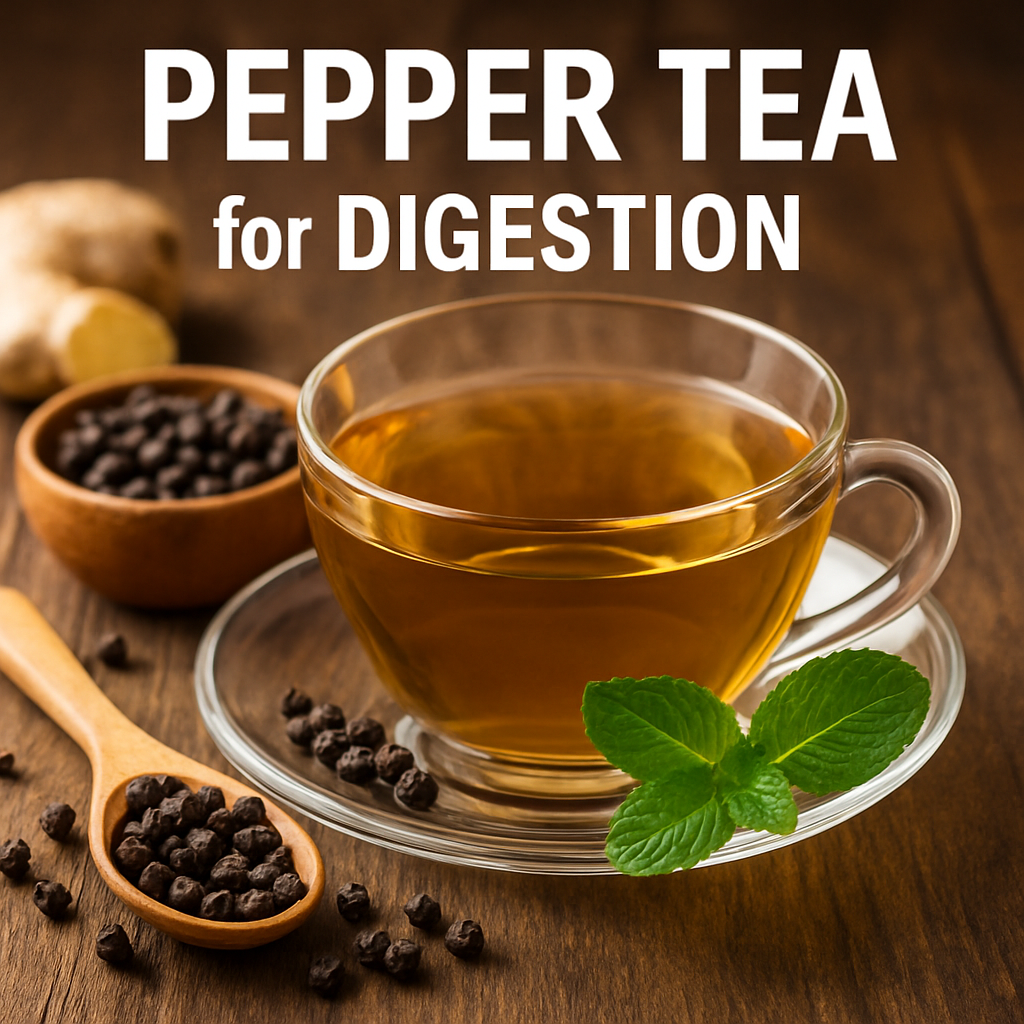
Black Pepper–Turmeric Milk/Detox Tonic
Warm 1 cup milk (or your preferred non-dairy substitute) and whisk in ½ teaspoon turmeric powder.
Add a pinch of fresh ground black pepper, and a drizzle of honey to taste.
Piperine in the pepper enhances curcumin absorption in turmeric.
While, the warmth of the milk base comforts digestion.
Benefits: These golden tonic decreases inflammation.
It enhances immunity against the changing seasons.
It aids liver detox, and induces deeper, more restful sleep, making it a perfect nighttime wellness ritual.
Use of black pepper antioxidant boost for immunity and digestion at home.
It minimizes the chances of side effects with its natural digestive effects.
Black pepper is a nutrient absorption enhancer, leading to effective absorption of nutrients in the body.
Hence, it helps improve health.
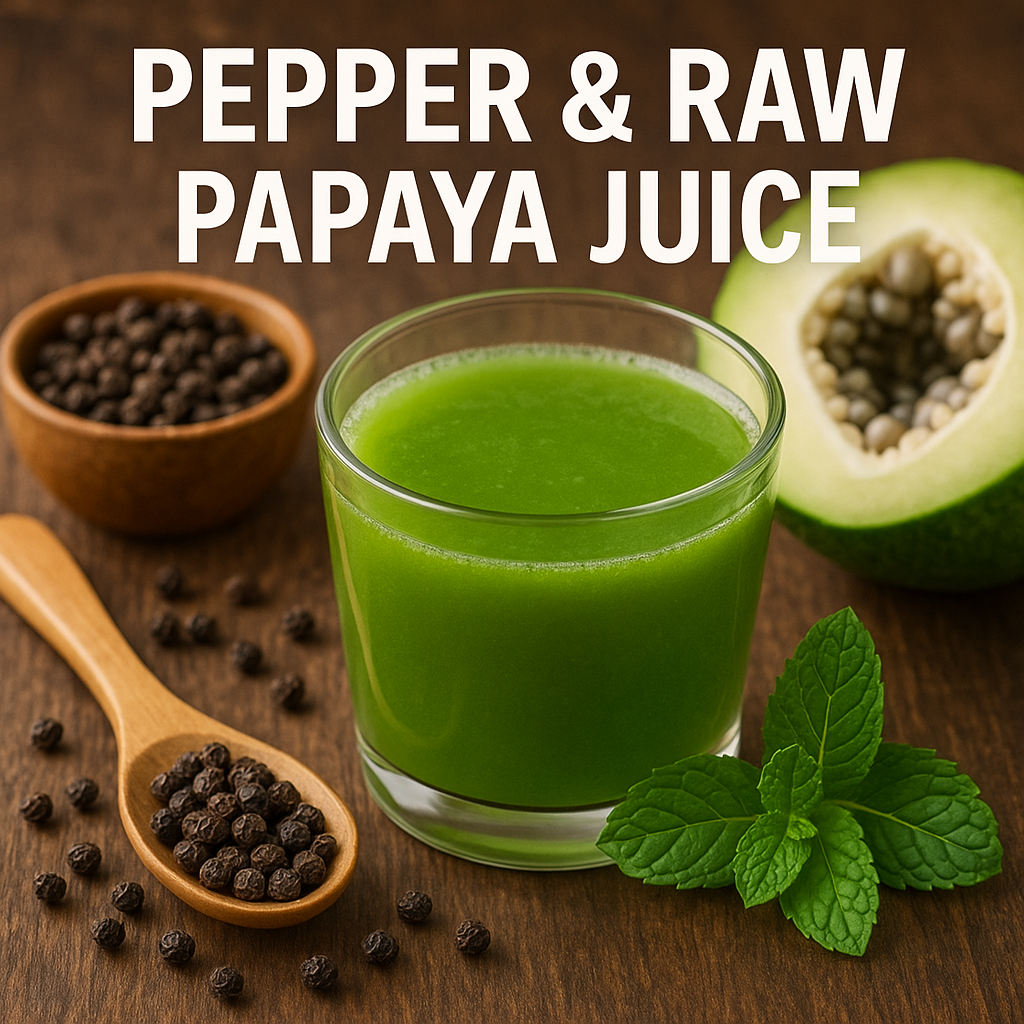
Pepper & Raw Papaya Juice
Grate raw papaya and blend to yield fresh juice, and mix in a pinch of ground black pepper and a bit of grated ginger for added heat.
This sweet-spicy mixture ignites digestive fire and facilitates enzyme action.
Benefits: Assists in breaking down proteins effectively, accelerates metabolism, enhances nutrient uptake.
It provides a concentrated antioxidant boost for healthy skin and inner cleansing.
Daily Seasoning Dose
Sprinkle crushed pepper freshly cracked over salads, soups, boiled eggs, sautéed vegetables, or even fresh fruits for a gentle spicy taste.
Grinding the pepper immediately before use maintains the piperine strength at its highest and flavor-rich.
Benefits: Makes food taste better, contributes to digestion at each meal, enhances absorption of vitamins and antioxidants from other foods.
It contributes consistently to long-term metabolic health and immunity.
Ayurvedic use of kali mirch or black pepper daily can boost metabolism health within the body.
It minimize the long-term health issues related to digestive problems more effectively.
5. Safety & Precautions
Safe in Food Amounts
1–2 pinches or up to ¼ teaspoon of black pepper per day is ideal for most healthy adults. This quantity offers health benefits without overburdening the digestive system. It can be safely sprinkled over food or added to beverages for gentle, continuous support.
Acid-Sensitive Caution
Those with GERD, acid reflux, or stomach ulcers might experience black pepper as irritating, as it tends to stimulate gastric acid secretion. Tiny quantities or avoidance during flare-ups could minimize discomfort, yet permit occasional flavor use.
Drug Interactions
Piperine in black pepper will affect the body’s ability to absorb and metabolize some medications, such as antibiotics, anticoagulants, and blood pressure medications. Always check with a healthcare provider before taking pepper in concentrated supplement form to prevent changing drug efficacy.
Pregnancy & Lactation
Black pepper in usual food quantities is generally safe during pregnancy and lactation. But avoid excessive medicated or high-dose supplement intake unless specifically advised by a trained healthcare professional to avoid unwanted risks.
6. FAQs
Q1: How much black pepper should I use daily?
A: A pinch to ¼ tsp in meals or beverages is ideal. Avoid excessive supplement doses unless under guidance.
Q2: Is black pepper better raw or cooked?
A: Crushing or lightly warming activates piperine; avoid overheating to preserve potency.
Q3: Can black pepper help with weight loss?
A: It may enhance metabolism and fat breakdown in studies, but it should complement a healthy diet and exercise
Q4: How do I combine black pepper with turmeric effectively?
A: Add a pinch of pepper to turmeric remedies or dishes. Piperine increases curcumin absorption by up to 2000%
Call To Action
The moral of the study is that from enhancing metabolism and digestion to improving immunity and joint function.
Black pepper shows it’s much more than a spice in the kitchen. Its antioxidant piperine acts synergistically with other nutrients, making it a superfood in contemporary wellness and Ayurveda.
Try starting your day with a papaya-and-pepper shot or winding down with turmeric-pepper milk.
Notice any changes in energy, digestion, or mood? Share your experience in the comments. You might just inspire someone else to sprinkle a little more wellness into their day. Follow us for more health-related news and advice.
